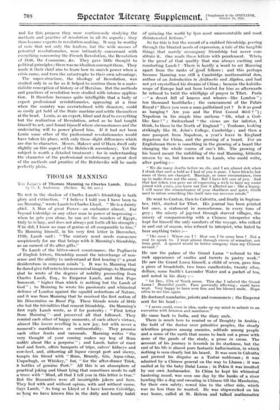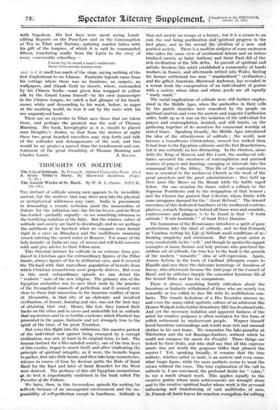THOMAS MANNING
Tic Letters of Thomas Manning to Charles Lamb. Edited by G. A. Anderson. (Seeker. 8s. 6d. net.)
To rest in the shadow of Charles Lamb's friendship is both glory and extinction. " I believe I told you I have been to see Manning," wrote Lamb to Charles Lloyd. " He is a dainty chiel. A Man of great Power—an enchanter almost. Far beyond Coleridge or any other man in power of impressing— when he gets you alone, he can act the wonders of Egypt. Only he is lazy, and does not always put forth all his strength ; if he did, I know no man of genius at all comparable to him." To Manning himself, in his very first letter in December, 1799, Lamb said : " The century must needs commence auspiciously for me that brings with it Manning's friendship, as an earnest of its after gifts."
To Lamb of the bitter-sweet countenance, the Pagliaccio of English letters, friendship meant the interchange of non- sense and the ability to understand at first hearing (" a great desideratum in common minds "). It was to Manning that he dared give full rein to his nonsensical imaginings, to Manning that he wrote of the degrees of nobility proceeding from Charles Lamb, Esq., to Emperor Lamb, and then Pope Innocent, " higher than which is nothing but the Lamb of God " ; to Manning be wrote his passionate and whimsical defence of London against the squalid seductions of Nature, and it was from Manning that he received the first notion of his Dissertation on Roast Pig. These friends wrote of little else but the trivialities that cement friendship. On Manning's first reply Lamb wrote, as if for posterity : " First letter from Manning "—and preserved all that followed. -They remind each other of happy moments, of each other's virtues, almost like lovers revelling in a new joy, but with never a moment's mawkishness or sentimentality. They promise each other feasts and carousals. Manning writes " the very thought of your coming makes my keg of Rum wobble about like a porpoise " ; and Lamb, hater of roast beef and fowls, offers banquets of tripe, calves' kidneys and cow-heel, and, abhorring all liquor except port and sherry, tempts his friend with " Rum, Brandy, Gin, Aqua-vitae, Usquebagh, or Whiskey," but, " for the after-dinner Trick, 8 bottles of genUirie Port." - All this is an atmosphere- of practical joking and blunt lying that sometimes needs to call a truce with " Mind, all that I tell you in this letter is true." But the Romantics were all incorrigible jokers and liars. They lied with and without-opium, with and without cause. Says Lamb, "As long as Lloyd or I have known Coleridge, so -long we have /Mown 'him in the daily and hourly habit'
of quizzing the world by lyes most unaccountable and most disinterested fictions."
So far this is but the record of a crabbed friendship, peering through the blunted needs of expression, a tale of the tangible things that merely -accompany friendship but never con-
stitute it. One reads these letters with puzzlement. Where is the proof pf that quality that Was ithisys exciting and comforting Lamb ? -Theft is hardly a :word to set Manning apart from the ranks of good felloivs ; and this perhaps because Manning was still a. Cambridge. mathematical don, author of an Introduction to Arithmetic and Algebra, and had not yet crystallized his drealos -of China ; becauie the kaleido- scope-of Europe hid not been twirled for him as afterwards he refused to twirl the whirligigs of prayer in Tibet. Paris —" a desert full of knaves and whores—like London " ; ten thousand bootblacks ; the caravanserai of the Palais Royal (" Have you seen a man guillotined yet ? Is it as good as hanging ? Are you and the First Consul thick ?"); Napoleon in his simple blue uniform " Oh, what a God- like face ! " ; Switzerland " the views are far inferior, I think, to those in the North of England " ; Toulouse, looking strikingly like St. John's College, Cambridge ; and then a rare passport from Napoleon, a year's leave in En gland departure for China, and the growing of a beard. For an Englishman there is something in the growing of a beard like changing the whole course of one's life. The growing of his beard meant the unfolding of the real Manning, hitherto unseen by us, but known well to Lamb, who could write,
after parting :— •
" We die many deaths before we die, and I am almost sick when I think that such a hold as I had of you is gone. I have friends, but some of them are changed. Marriage, or some circumstance, rises up to make them not the same. But I have felt sure of you. And that last token you gave me of expressing a wish to have my name joined with yours, you know not how it affected me : like a legacy. I will nurse the remembrance of your shadiness and quiet, which used to infuse something like itself into our nervous minds."
He went to Canton, then to Calcutta, and finally in Septem- ber, 1811, started for Tibet. His journal has been printed but once, a statement in monochrome, in every- tone of grey ; the misery of jog-trot through starved villages, the misery of companionship with a Chinese interpreter who kept for himself the only comforts of the voyage, who sulked in and out of -season; who refused to interpret, who hated to hear anything twice :--
" The snow ! Where am I ? How can I be come here ? Not a soul to speak to. I wept almost through excess of sensation, not from grief. A spaniel would be bettor company than my Chinese servant."
He saw the palace of the Grand Lama " reduced to the rock appearance of castles and turrets in pastry work." He saw the Grand Lama himself, a child of seven, gave him a piece of broadcloth, two brass candlesticks, twenty silve, dollars, some Smith's Lavender Water and a packet of tea, and noted in his diary " 1st Dec., 17th of Tenth moon. This day I saluted the Grand Lama ! Beautiful youth. Face poetically affecting ; could have wept. Very happy to have seen him and his blessed smile. Hope often to see him again.
He doctored mandarins, priests and commoners ; the Emperor sent for his head :— '
" I never could, even in idea, make up my mind to submit to an execution with firmness and manliness.'
He came back to India, and the diary ends.
There is much here to remind us of Doughty in Arabia the hold of the doctor over primitive peoples, the steady. rielentless progress among enemies, solitude among people and a sense of the earth that seems to-hack out a prose with none of the gauds of the study, a prose in vacuo. The account of his journey is feverish in its starkness, but .the end of his life is almost pure fantastic hallucination, in which' nothing is seen clearly but his beard. It was seen in Calcutta and pierced his disguise as a Tartar nobleman ; it was admired by a Chinese general on the way to Lhassa ; it was • smiled at by the baby Dalai Lama ; in Pekin it was insulted by our own Ambassador. In China he kept his whimsical bantering mood, was seen one day by. the banks of a river howling like a dog and swearing in Chinese till the Mandarins, -for their own safety; rowed him to the other side, which was no less than he wanted. He was shipwrecked on his way home, called at St. Helena and talked mathematics with Napoleon. His last days were spent seeing Lamb editing Reports on the Poor-Law and on the Consumption of Tea in Tibet and Tartary, quizzing maiden ladies with his gift of the tongues, of which it is said he commanded fifteen, translating madly from the Latin to the envy of every conceivable schoolboy— I must try to mend a man's waistcoat.
Imus tritu menda manswscat.
and, lest it smell too much of the shop, saying nothing of the first Englishman to see Lhassa. Fantastic legends came from his cottage where there was no furniture, no carpets, no wallpapers, and (thank God) no insects, where, surrounded by his Chinese books—some given him wrapped in yellow silk by the Grand Lama himself—by his own manuscripts in the Chinese tongue, we catch a last glimpse of his beard, snowy white and descending to his waist, before, in anger at the mocking world, he tore it out by the roots with his one unparalysed hand.
There are no mysteries in Tibet save those that are taken there, and perhaps the greatest was the soul of Thomas Manning. His book, hieroglyphic as it is, should be placed near Doughty's Arabia, so that from the shelves at night these two great bearded travellers may step forth and talk of the solitudes and derangements of the soul, and this would be no greater a marvel than the wonderment and con- tentment of the great friendship of Thomas Manning and































































 Previous page
Previous page